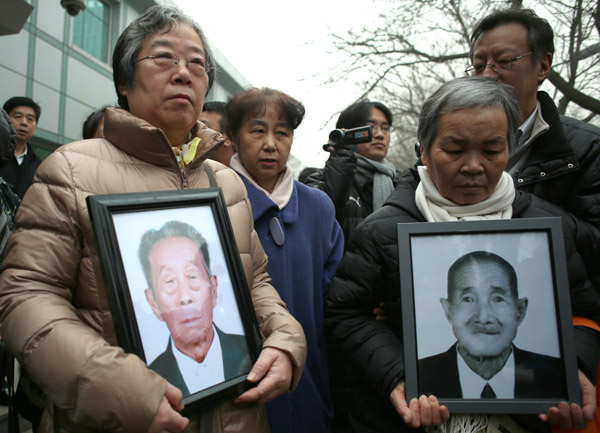Mitsubishi's apology insincere if not given to all slave laborers
(China Daily) Updated: 2015-07-22 08:53
 |
|
Relatives of deceased Chinese forced laborers, accompanied by lawyer Kang Jian (center, in blue coat), attend Beijing No 1 Intermediate People's Court on Feb 26, 2014, to sue two Japanese companies over forced labor during World War II. The lawsuit seeks printed apologies to be carried in Chinese and Japanese newspapers as well as compensation from the Japanese companies. WANG JING / CHINA DAILY |
At a Los Angeles museum on Sunday, Japanese construction giant Mitsubishi Materials Corp apologized for using former US prisoners of war as slave laborers during World War II. This is reportedly the first time that a major Japanese company has expressed such remorse, and those from China and the Korean Peninsula forced to work for Japanese companies are still waiting for an apology. Comments:
For 70 years, since the war ended, the former prisoners of war who worked for these Japanese companies have asked for something very simple: They have asked for an apology. We hope to extend Mitsubishi's gracious coming forward at this time to all the other mines and factories who employed American POWs against their will.
James Murphy, a 94-year-old US veteran who survived being used as forced labor, July 19
Mitsubishi Materials Corp's apology is incomplete, even insincere, because it seems to use Murphy's forgiveness to shirk from reflecting on what the company did to forced laborers from China and the Korean Peninsula during World War II. None of those Chinese victims have heard a proper apology from the Japanese company over the past seven decades. Such an apology will be cowardly and hypocritical if it is only delivered to US citizens, if not for any other ulterior motive.
xinhuanet.com, July 20
One thing is for sure, the Japanese company's apology is better than nothing even it was exclusively made to US POWs. But the company should do the same to the Chinese and Korean laborers and respect their relatives' legal rights, otherwise Japan's national image may be tarnished.
Liu Jiangyong, a professor of international studies at Tsinghua University, July 20











